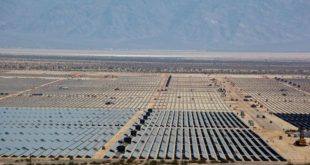WASHINGTON, DC – As part of the Obama Administration’s SunShot Initiative to make solar energy cost-competitive with fossil fuels within the decade, U.S. Department of Energy Secretary Steven Chu today announced the availability of more than $27 million in new funding that will reduce the non-hardware costs of solar energy projects, a critical element in bringing down the overall costs of installed solar energy systems.
The funding will support a $12.5 million challenge to encourage cities and counties to compete to streamline and digitize permitting processes, as well as $15 million that will be made available to advance innovations in information technology systems, local zoning and building codes and regulations, and more. These process improvements and innovations will help increase U.S. competitiveness in the global solar industry and will play an important role in achieving President Obama’s goal of doubling America’s electricity from clean energy sources.
“These investments under the SunShot program can help to transform the solar energy industry by addressing significant challenges to solar energy deployment, including permitting and installation,” said Secretary Chu. “Innovations in IT and local business processes, such as online permit applications, can deliver significant savings for solar energy systems and will help America to compete globally in this growing market.”
Both funding opportunities focus on reducing “non-hardware balance of system” costs, which generally refer to the costs of installing solar systems not associated with the solar panels, mounting hardware, electronics, etc. These “soft costs,” including the capital required to pay for siting, permitting, and installation, as well as the cost of connecting the systems to the grid, can represent up to 40 percent of the total cost of the solar energy system.
A major obstacle for homeowners and developers looking to invest in solar energy is navigating the differing and expensive administrative processes of various towns, cities, and counties across the nation and securing financing for their projects. These projects will help standardize some of the processes, cut upfront fees and paperwork, and reduce the overall costs associated with permitting and installation, making it easier and cheaper for homeowners, businesses and their local communities to deploy solar energy.
Rooftop Solar Challenge – up to $12.5 million
Under the Rooftop Solar Challenge local and regional government teams can compete for funds to help eliminate administrative barriers to residential and small commercial photovoltaic (PV) solar installations and improve the availability of financing for solar projects. This Challenge incentivizes local governments to develop innovative solutions in four key areas:
* Standardizing permitting processes;
* Updating planning and zoning codes;
* Improving interconnection and net metering standards; and
* Increasing access to financing.
Every jurisdiction in each winning team must adopt the same processes, which will help address the challenge of different communities having different sets of rules and regulations. The winners will also remove siting restrictions from local codes and land use policies and will increase access to financing options for homeowners by promoting innovative financing mechanisms like solar leasing and group purchasing.
Balance of System Costs – up to $15 million over three years
This funding opportunity will create tools that local governments can use to streamline and expedite the process of installing solar energy. DOE will fund one or more recipients under each of the following topic areas:
* Codes, Standards and Processes – Projects in this topic area will work to improve existing codes, standards, and permitting processes; train code officials on new codes; and develop best practices and model codes that can be used in communities nationwide.
* Software Design Tools and Databases – Projects in this topic area will develop a range of IT systems and databases, including a utility-scale planning tool that identifies sites available for solar project development, IT tools to help installers and local governments prepare and process permit applications, and a database of local permitting processes nationwide.
* Regulatory and Utility Solutions – Projects in this topic area will provide technical support for utilities to better integrate solar energy into utility operations. Projects will also provide support for states as they develop or improve the regulatory frameworks necessary to sustain a growing solar market.
For more information on the SunShot Initiative, visit www.energy.gov/sunshot.
 Alternative Energy HQ solar power for homes, wind energy, and bio fuel issues
Alternative Energy HQ solar power for homes, wind energy, and bio fuel issues






